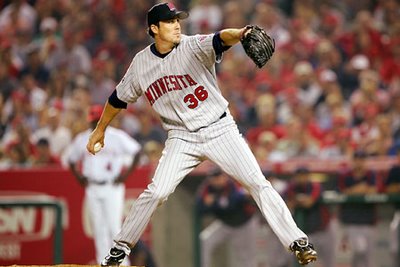October 25, 2009
Should The Twins Trade Nathan?

Removing two bone chips from the elbow of a 34-year-old pitcher like Nathan is a bigger deal, but the procedure is still not considered especially risky. For instance, Johan Santana had bone chips taken out of his left elbow in October of 2003 and won his first Cy Young award in 2004 by going 20-6 with a league-leading 2.61 ERA and 265 strikeouts while not missing a start. Nathan is a higher risk due to his age and somewhat diminished velocity over the past two years, but there's still no reason to panic.
There's also no reason to assume that the bone chips "explain" his ugly postseason outing against the Yankees in Game 2 of the ALDS given that his elbow felt strong enough for him to finish the regular season by converting 13 straight saves with a 1.17 ERA and 19-to-5 strikeout-to-walk ratio in his final 15 appearances. And really there's no reason to "explain" one game, however awful, although certainly plenty of fans and media members are willing to equate the outing to some sort of weakness mentally.
During the regular season Nathan blew five saves and allowed seven homers, so his blowing a save against the best offense in baseball by allowing a homer to one of the greatest hitters of all time hardly seems like evidence of much beyond the fact that good players can have bad games and the playoffs are unpredictable. Along with Nathan, the list of closers who've blown saves this postseason includes Jonathan Papelbon, Huston Street, Jonathan Broxton, Brian Fuentes, and Ryan Franklin. It happens.
People who misguidedly think that every closer should convert every save opportunity in every playoff game are now calling for the Twins to trade Nathan, who since joining the team in 2004 has posted a 1.87 ERA in 419 innings while converting 91 percent of his save chances. That includes a career-high 47 saves with a 2.10 ERA, 89-to-22 strikeout-to-walk ratio, and .171 opponents' batting average in 68.2 innings this season, so decreased velocity and elbow issues or not he remained a stud in 2009.
On the other hand, while calling for Nathan to be traded because of one ugly postseason appearance is silly the notion of trading a 34-year-old closer, period, is perfectly reasonable. He's paid a premium for a limited amount of work because teams' over-reliance on the save statistic assigns added value to the ninth inning, but closers are created rather than born and Nathan himself was merely a very good setup man before arriving in Minnesota.
A huge part of Nathan's value, both perceived and real, comes from the fact that the Twins use him for the ninth inning, but they're free to trade him and begin building up another pitcher's value by utilizing them in the exact same role. Successful closers aren't something that fall from the sky, fully formed with mid-90s fastballs and ice water running through their veins. Instead most great setup men who're given a chance to pitch the ninth inning become successful closers, and then the process repeats.
Of course, the question is whether the Twins have that great setup man waiting in the wings, because regardless of what you think of saves as a measure of value and closers as a defined role the fact is that Nathan has been one of the elite relievers in baseball in each the past six seasons. Actually, that's probably understating his case, because Nathan has been one of the elite relievers ever. Here are the top adjusted ERA+ figures from relievers with at least 650 career innings:
IP ERA+
Mariano Rivera 1090 202
Billy Wagner 834 182
JOE NATHAN 685 157
Tom Henke 790 156
John Wetteland 765 148
Trevor Hoffman 1042 147
Troy Percival 709 146
Dan Quisenberry 1043 146
Hoyt Wilhelm 2254 146
Mark Eichhorn 886 142
If you focus on his run prevention Nathan has been one of the greatest relievers in baseball history. If you focus on his save percentage Nathan has been one of the greatest closers in baseball history. And in either case his performance this season fits in perfectly with the rest of his dominant Twins career. Regardless of the setup men waiting in the wings the chances of finding one to truly replace Nathan's performance are next to impossible.
However, with his 35th birthday next month, a pair of bone chips recently removed from his elbow, and some signs of diminished raw stuff Nathan's odds of continuing that spectacular run aren't particularly great either. In other words, the Twins wouldn't be replacing the Nathan who has been one of the best relievers of all time through the age of 34, they'd be replacing the Nathan who's turning 35 and is owed $11.25 million in each of the next two years with a $12.5 million option or $2 million buyout for 2012.
If you're going to call for the Twins to trade Nathan, don't do it because he served up a home run to Alex Rodrigez. Do it because he carries a huge amount of value, perhaps even more perceived value, and is about to turn 35 while being owed a ton of money over the next 2-3 seasons. In other words don't call for the Twins to trade Nathan unless you were calling for it before Rodriguez even stepped to the plate. For better or worse, it makes exactly as much sense now as it did then.
Once you're done here, check out my NBCSports.com blog and Twitter updates.

